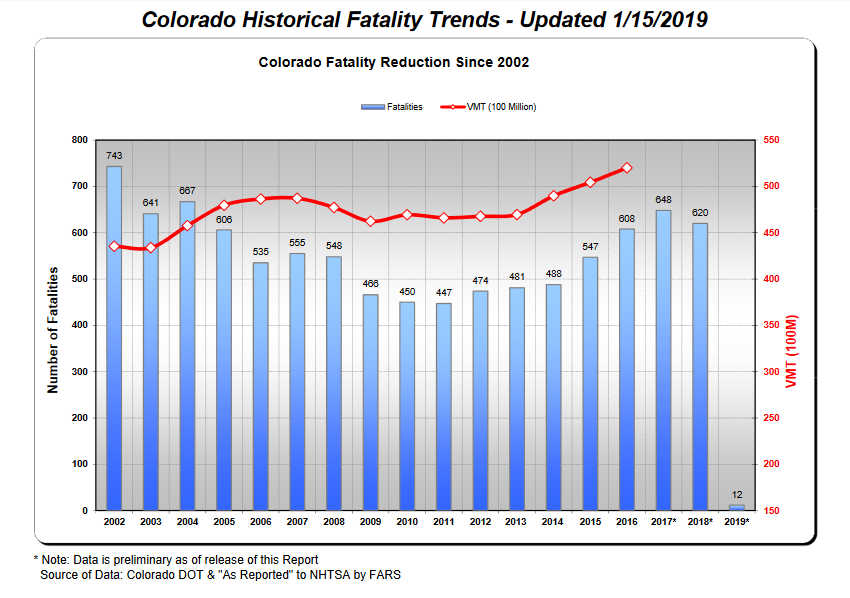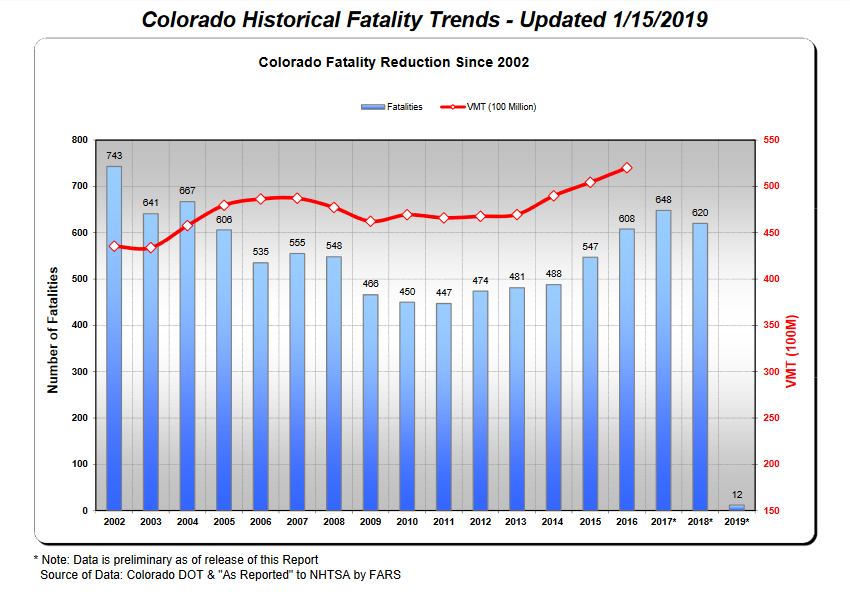January 28, 2019
The New York State Association of Police made a statement opposing legalization of cannabis for adult-use in New York, in response to Governor Cuomo’s announcement that he plans to pass legislation April 1st, with the budget, that will legalize cannabis for adult-use in New York. The New York State Association of Police said traffic safety is a major concern, citing an increase in vehicle-related fatalities by 62 percent in Colorado the first year cannabis was legalized in the state.
Roc NORML is the Rochester chapter of the National Organization for the Reform of Marijuana Laws, and we want to make sure the public is aware that statement is simply not true. Here are the number of vehicle-related fatalities, according to the Colorado Department of Transportation:
| Year |
Total Number of Vehicle Related Fatalities |
% Change (+/-) from previous year |
Notes |
| 2002 | 743 | 2 years before medical legalization, the largest number of vehicle-related fatalities in the last 17 years | |
| 2003 |
641 |
1 year prior to legalization |
|
| 2004 | 667 | +4.1% | Sales began January 1 |
| 2005 | 606 | -9.1% | |
| 2006 | 535 | -11.7% | |
| 2007 | 555 | +3.7% | |
| 2008 | 548 | -1.2% | |
| 2009 | 466 | -15.0% | |
| 2010 | 450 | -3.4% | |
| 2011 | 447 | -0.1% | |
| 2012 | 474 | +6.0% | Â Adult-use passes by ballot |
| 2013 | 481 | +1.5% | |
| 2014 | 488 | +1.5% | Â Adult use-sales go into effect |
| 2015 | 547 | +12.1% | |
| 2016 | 608 | +11.2% | |
| 2017 | 648 | +6.7% | |
| 2018 | 620 | -4.3% | Â Four years into adult-use sales, net fatalities below 2002 despite rise in population and increased miles traveled |
| Total % change from pre-legalization (2003) until 2018 = -3.3% | |||
| Total % change from pre-legalization (2003) until 5 years post (2009) = -27.3% | |||
At the same time, we should also acknowledge the overall population in Colorado has increased significantly, an increase of 13.2% as estimated by the US Census. Furthermore, when we look at states that haven’t legalized cannabis for adult-use, take Alabama for example, we see similar trends related to number of vehicle related fatalities.
The conclusions we can draw from this data are as follows:
- – Legalization does not lead to a decrease in road safety, and the argument can even be made, with this data, that roads become more safe after legalization;
- – We need to approach this topic in the same way we approach any other substance that doesn’t have a biological field sobriety test associated with it, like Ambien or Xanax, and we need to put responsibility in the hands of the consumer and expect them not to operate a motor vehicle if they are intoxicated from the substance; and
- – As advised by the American Automobile Association (AAA), we urgently need more research, and we shouldn’t put arbitrary “per se” driving limits for the presence of THC, as they improperly classify motorists who are not behaviorally impaired.
While we can understand law enforcement’s hesitancy to embrace legalization after their efforts against the plant during the War on Drugs, we want to urge them to consider the benefits we’ve seen in other states that have legalized. Most notably, law enforcement from those states have increased the rate at which they solve more serious crimes, like automobile theft and assault, as well as an overall decrease in serious crimes, like murder and rape.
Roc NORML is dedicated to educating the public about the benefits of responsible cannabis use and we look forward to continuing these conversations with local law enforcement. Please visit www.rocnorml.org for more information about how you can get involved and follow ROC NORML on Facebook and Twitter.Â
You can read more about marijuana and psychomotor performance on NORML’s factsheet here.












